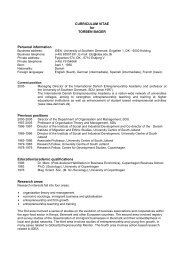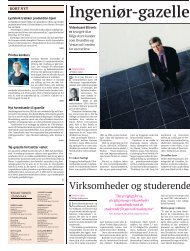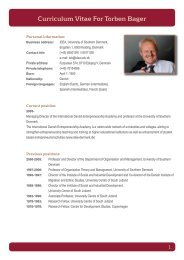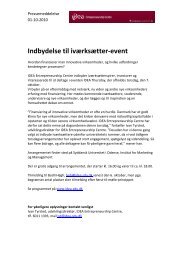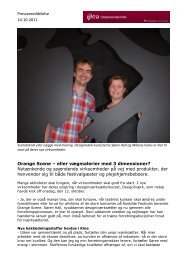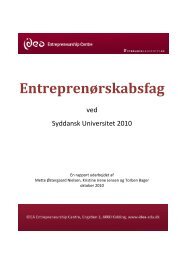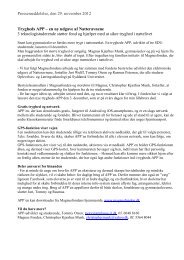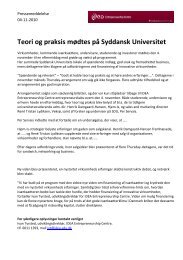Education, Training and Networking for Entrepreneurship in ...
Education, Training and Networking for Entrepreneurship in ...
Education, Training and Networking for Entrepreneurship in ...
You also want an ePaper? Increase the reach of your titles
YUMPU automatically turns print PDFs into web optimized ePapers that Google loves.
Part 1<br />
Introduction<br />
Chapter 1<br />
Is entrepreneurship exp<strong>and</strong><strong>in</strong>g through education, tra<strong>in</strong><strong>in</strong>g, competency<br />
<strong>and</strong> network<strong>in</strong>g?<br />
Once upon a time, entrepreneurship was considered<br />
someth<strong>in</strong>g people might do if they were<br />
gifted <strong>and</strong> <strong>in</strong>spired. Success was considered<br />
the result of a gift, received at birth, the result of<br />
br<strong>in</strong>g<strong>in</strong>g the gift to fruition, <strong>and</strong> the successful<br />
bus<strong>in</strong>ess might br<strong>in</strong>g a glorious reputation to<br />
its founder. Failure was often attributed to lack<br />
of such a gift, <strong>and</strong> the failure would br<strong>in</strong>g disrepute<br />
to the starter. Considered a matter of gift<br />
<strong>and</strong> <strong>in</strong>spiration, entrepreneurship did not <strong>in</strong>volve<br />
learn<strong>in</strong>g.<br />
The conception of entrepreneurship changed.<br />
<strong>Entrepreneurship</strong> came to be considered someth<strong>in</strong>g<br />
that can be learned. Learn<strong>in</strong>g could come<br />
through trial <strong>and</strong> error <strong>in</strong> solitude. Success was<br />
considered the result of hard work, through a<br />
series of trials <strong>and</strong> errors, conducted <strong>in</strong> solitude.<br />
Considered someth<strong>in</strong>g learnable by experienc<strong>in</strong>g<br />
trials <strong>and</strong> errors <strong>in</strong> solitude, entrepreneurship<br />
did not <strong>in</strong>volve <strong>in</strong>struction or learn<strong>in</strong>g from<br />
others.<br />
The conception is chang<strong>in</strong>g aga<strong>in</strong>. Nowadays,<br />
entrepreneurship is considered learnable, both<br />
as codified knowledge that can be acquired<br />
through <strong>for</strong>mal <strong>in</strong>struction <strong>and</strong> education <strong>and</strong><br />
as tacit knowledge that can be acquired as advice,<br />
as know-how <strong>and</strong> as experiential learn<strong>in</strong>g,<br />
<strong>for</strong> example as apprentice <strong>in</strong> a bus<strong>in</strong>ess.<br />
Educators <strong>and</strong> policy-makers are now busy creat<strong>in</strong>g<br />
<strong>and</strong> extend<strong>in</strong>g <strong>in</strong>struction <strong>in</strong> entrepreneurship,<br />
so that more levels <strong>and</strong> k<strong>in</strong>ds of education<br />
will <strong>in</strong>clude <strong>in</strong>struction <strong>in</strong> entrepreneurship,<br />
so that more pupils, students <strong>and</strong> adults<br />
will learn entrepreneurship, so that they will<br />
learn more elements of entrepreneurship, not<br />
only th<strong>in</strong>gs like develop<strong>in</strong>g a bus<strong>in</strong>ess plan,<br />
plann<strong>in</strong>g production <strong>and</strong> target<strong>in</strong>g sales, but<br />
also the very <strong>in</strong>ception of the entrepreneurial<br />
process such as nurtur<strong>in</strong>g motivation, pursu<strong>in</strong>g<br />
<strong>in</strong>terests, generat<strong>in</strong>g bold ideas, elaborat<strong>in</strong>g<br />
sketches <strong>and</strong> evaluat<strong>in</strong>g feasibilities.<br />
<strong>Entrepreneurship</strong> can be conceptualized as the<br />
activity that comprises discover<strong>in</strong>g opportunities<br />
<strong>and</strong> the exploitation of opportunities <strong>in</strong> exist<strong>in</strong>g<br />
<strong>and</strong> new firms. The activity is now <strong>in</strong>stitutionalized<br />
<strong>and</strong> supported <strong>in</strong> society, with a social<br />
role <strong>for</strong> per<strong>for</strong>m<strong>in</strong>g the activity, the vocation<br />
called the entrepreneur (Christensen 2005,<br />
Swedberg 2000). It may there<strong>for</strong>e be fruitful to<br />
focus on the people who may become <strong>in</strong>volved<br />
<strong>and</strong> per<strong>for</strong>m the activity <strong>and</strong> the learn<strong>in</strong>g affect<strong>in</strong>g<br />
their <strong>in</strong>volvement <strong>and</strong> per<strong>for</strong>mance.<br />
I here <strong>in</strong>vestigate people’s learn<strong>in</strong>g through<br />
their education <strong>in</strong> entrepreneurship, their tra<strong>in</strong><strong>in</strong>g<br />
<strong>in</strong> start<strong>in</strong>g a bus<strong>in</strong>ess, <strong>and</strong> their network<strong>in</strong>g<br />
through which they may learn, <strong>and</strong> <strong>in</strong>vestigate<br />
how people’s learn<strong>in</strong>g exp<strong>and</strong>s their <strong>in</strong>volvement<br />
<strong>in</strong> entrepreneurship <strong>and</strong> how entrepreneurs’<br />
learn<strong>in</strong>g exp<strong>and</strong>s their <strong>in</strong>novation, exports<br />
<strong>and</strong> expectations <strong>for</strong> growth.<br />
The monograph first considers the methods <strong>for</strong><br />
the <strong>in</strong>vestigation,<br />
How can we research entrepreneurship?<br />
More specifically, Chapter 2 addresses the<br />
methodological problem,<br />
13




